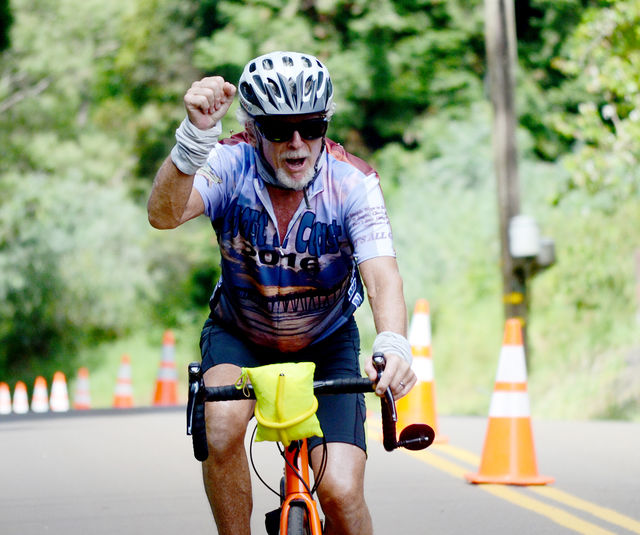KOKEE — When John McIntyre crossed the finish line of this year’s Pedal to the Meadow, he raised his right arm, pumped his fist and smiled. A big, joyful smile. Victory was his. But not just over 15.5 miles of
KOKEE — When John McIntyre crossed the finish line of this year’s Pedal to the Meadow, he raised his right arm, pumped his fist and smiled. A big, joyful smile.
Victory was his. But not just over 15.5 miles of uphill cycling from Kekeha to Koke State Park. On that day, the 65-year-old from Lihue had beaten his number one enemy, Lewy Body Dementia.
“I was slower than I hoped,” McIntyre said. “Mostly, I just wanted to have fun, and I did that.”
One wouldn’t know, in conversation, that McIntyre is battling dementia. He speaks in a steady voice, answers questions on point, and quickly recalls the challenges of his latest bike-riding adventure. He recounts humorous tales and chuckles as he tells them.
But on his back was this handmade sign: 3,000 miles + 52 days + dementia = ASK ME.
Some do. And McIntyre is happy to explain what it all means.
The 3,000 miles refers to a cross country bike ride with Bubba’s Pampered Pedalers from San Diego to St. Augustine, Fla. that started in early March and end in late April.
The 36 riders were joined by 20 staff members, that included bike mechanics, chefs and masseuse. They average 75 miles a day, recovered with dinner, and sleep, then headed out again the next morning, after coffee and breakfast.
“Speaking of roads, there are some hellacious bad, bad roads, I never want to go on again,” he said, laughing.
Highway 80 coming out of Texas was one of them: Narrow shoulder and lots of traffic and plenty of skunks and snakes, too.
“Pretty nasty,” McIntyre said.
But he was pleased to complete the ride.
“It was partially for my bucket list and trying to get the message across that dementia is not a good thing to have, but it’s not terrible right away,” he said.
Susan Coan, John’s partner, wrote about the impact of Lewy Body Dementia on McIntyre and why the bike ride was so important to him.
“John wants very much to share this story because he hopes that other people with LBD will be inspired to live as fully as they can,” she wrote. “He also would like to reach people who don’t yet realize that a diagnosis of dementia does not mean a person is incapable of doing something awesome.”
The ride, she wrote, was difficult to prepare for and some days John struggled, but overall, it helped.
“There were a few nights in which he woke them up shouting in his sleep with his REM Sleep Behavior Disorder. There were many occasions in which fellow riders or staff reminded him that he was leaving his backpack behind in a restaurant or other venue,” Coan wrote. “John reveled in the feeling of the wind on his face as he biked down the road, he described it as a meditative state while riding.”
McIntyre began showing signs of dementia a few years ago. Forgetting names, places, things. Getting lost. Unable to recall what was once just routine. Mood swings.
“I forget what I’m saying or stop in middle of sentence,” he said.
Doctors told him he had Lewy Body Dementia, which is related to Parkinson’s Disease. According to the Lewy Body Dementia Association, LBD is not a rare disease. It affects an estimated 1.4 million individuals and their families in the United States.
“Because LBD symptoms can closely resemble other more commonly known diseases like Alzheimer’s and Parkinson’s, it is currently widely underdiagnosed,” the association’s website states. “Many doctors or other medical professionals still are not familiar with LBD.”
LBD is an umbrella term for two related diagnoses. LBD refers to both Parkinson’s disease dementia and dementia with Lewy bodies. The earliest symptoms of these two diseases differ, but reflect the same underlying biological changes in the brain. Over time, people with both diagnoses will develop very similar cognitive, physical, sleep, and behavioral symptoms.
McIntyre said he noticed changes years ago and didn’t know what was happening. He was diagnosed with mild cognitive impairment for almost three years before doctors said he had LBD.
While there is no cure, there was weapons he uses daily.
He does his best to stay physically active, which he strongly believes benefits his thought process. He also follows a healthy diet, takes naps, follows a medication program and posts reminder notices to himself and uses other memory aids.
“It’s becoming more and more necessary to do that,” McIntyre said.
He still handles chores around the house, like mowing the lawn, and spends time on the computer for research.
While moodiness is one of the symptoms, McIntyre hasn’t lost his sense of humor.
“Don’t ask me to balance your checkbook,” he said.
“I’m glad I have the facilities today that I have because there are so many people in the same time frame in way worse condition,” he said.
Neurologists have told him the decline from this disease can be anywhere from just a few years to decades.
“It could take 20 years before it’s debilitating,” he said. “So I’m living in the day.”
And on the day of Pedal to the Meadow, he reveled in success.
“It’s a good day today,” he said. “It felt good riding. I’m glad I was out there.”



